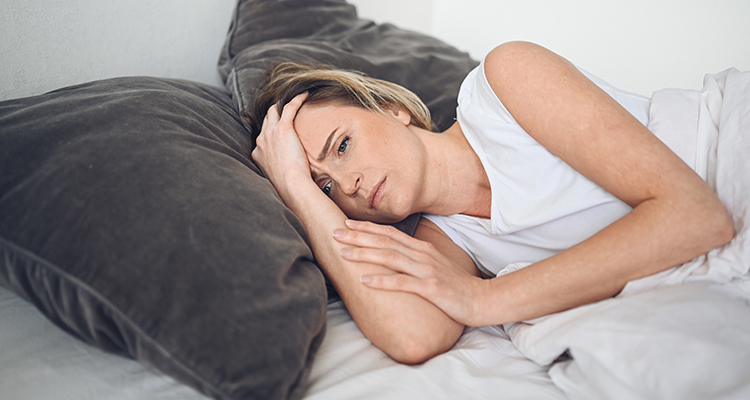Navigating Perimenopause and Menopause Insomnia
Menopause is a natural part of every woman’s development and for most, occurs between the ages of 45 and 55. As a woman’s estrogen levels start to decrease, their bodies begin to change. This progressive transformation is known as perimenopause. Some women will experience symptoms sooner than others but by the age of 55, most women are officially in menopause.

Common symptoms of menopause include irregular menstrual periods, hot flashes (including night sweats), mood changes, vaginal dryness, weight gain due to a slower metabolism, and trouble sleeping. Sleep problems are often attributed to night sweats and hot flashes, but other factors can cause insomnia during both menopause and perimenopause.
In this article, we’ll explore the changes women undergo during this physical milestone, how it can negatively affect sleep patterns, and what you can do to help.
Content
What Causes Menopause?
Menopause marks the end of most women’s menstrual cycle. During menopause, women experience physical, emotional, and hormonal changes — but why, exactly? As your ovaries produce fewer key hormones including estrogen and progesterone, you stop ovulating and stop having your menstrual period.

Menopause usually sets in 1 year after your last period. Perimenopause describes the time period leading up to the final end of your menstrual cycle. As estrogen and progesterone levels drop, menopause symptoms increase. These include mood swings, hot flashes, chills, and sleep troubles. Insomnia is a common side effect of both perimenopause and menopause. While some women struggle to fall asleep, others wake frequently throughout the night and struggle to fall back asleep.
Common Symptoms of Insomnia During Menopause
The inability to fall and stay asleep may not be something new for some women. From pregnancy and motherhood to daily stress, it can be difficult to achieve the recommended 7 to 9 hours of consistent sleep each night. But if you’re finding it increasingly difficult to fall and stay asleep and notice some of the above-mentioned symptoms, this new form of insomnia may be triggered by perimenopause.

Here are a few signs that your sleep troubles are an unpleasant side effect of menopause.
- Difficulty getting comfortable and falling asleep (taking longer than 30 minutes to fall asleep)
- Extreme mood swings that cause sadness or anxiety, making it difficult to fall asleep
- Waking up too early in the morning without being able to fall back asleep (also known as middle-of-the-night insomnia)
- Sleeping fewer than 6 hours per night more than 3 times per week
- Waking frequently due to being too hot (hot flashes or night sweats) or too cold (chills)
- Feeling unrested or not refreshed in the morning
- Constantly worrying about going to sleep or lack of sleep
- Feeling groggy, disorientated, and drowsy during the day
The effects of menopause insomnia can carry over from the night into the day. Some women experience more frequent accidents or errors due to a lack of focus and concentration. Trouble remembering things and other cognitive impairments are also common. Some women experience an increase in headaches and gastrointestinal issues including nausea, diarrhea, or bloating.
In time, lack of sleep and other hormonal and emotional changes can increase a woman’s risk of depression and a decline in their overall sense of well-being.
What Causes Insomnia During Perimenopause and Menopause?
Now that you know your sleep troubles are a common side effect of entering into menopause, let’s discuss why this happens. Significant changes in your body both physically and emotionally are common triggers for insomnia during this time.

Hormone Changes
Women are no strangers to mood swings triggered by hormone changes. Mood swings are one of the most common symptoms associated with PMS or premenstrual syndrome. As your body prepares to ovulate, a fluctuation in hormones, including estrogen and progesterone, causes feelings of sadness and irritability. These hormone changes also affect your body’s serotonin levels. Serotonin regulates your mood, sleep cycles, and appetite.
The same drop in estrogen and progesterone that occurs prior to your menstrual cycle occurs during perimenopause and menopause. In addition to serotonin, the hormone progesterone also regulates your sleep habits. This decrease in progesterone can make it difficult to fall and stay asleep, interfere with your circadian rhythm, and throw your sleep patterns off track.
Melatonin, which is your body’s natural sleep hormone, also decreases with age. The less of this hormone your body produces, the harder it is to fall asleep. As women enter menopause and reach the age of 40, melatonin levels decrease. A melatonin supplement may help. Estrogen decline during menopause can lead to other sleep disturbances including joint and muscle pain and bladder problems.
Hot Flashes and Night Sweats
About 75% of women report having hot flashes and night sweats during perimenopause and menopause. A hot flash is characterized by a sudden feeling of heat throughout your entire body. For most women, the feeling of warmth is most intense on the neck, chest, and face. Hot flashes can also cause sweating and reddening of the skin. Night sweats are hot flashes that occur at night, disrupting your sleep.
Sleep Apnea
Sleep apnea was once considered a sleep disorder that plagued only men but new studies suggest that hot flashes may increase a menopausal woman’s risk of developing sleep apnea. Sleep apnea is a sleep condition where you periodically stop and start breathing throughout the night. Obstructive sleep apnea is most common and occurs when your airways become blocked when the muscles in your throat relax too much.
Individuals who are overweight are at greater risk of developing sleep apnea. Since weight gain and a slower metabolism are also common side effects of menopause, this can add to a woman’s risk of developing this serious sleep disorder. Progesterone may also play a role since it affects muscle activity, including the muscles at the back of your throat. As progesterone levels decrease during menopause, women are more likely to experience an upper airway obstruction.
Other signs of sleep apnea in women include headaches, daytime fatigue, depression, anxiety, and waking frequently throughout the night. You may not realize your breathing is compromised but find yourself restless at night and tired during the day.
Restless Leg Syndrome (RLS)
Nearly 10% of people suffer from restless leg syndrome. Women are twice as likely to suffer from RLS — especially during perimenopause and menopause. The most common symptoms include a tingling or “crawling” sensation in the lower part of your legs, primarily at night. Sufferers feel an overwhelming urge to move their legs or even get up and walk around to relieve their discomfort. Patients with RLS often struggle with insomnia, as they struggle to find a comfortable sleeping position and resist the temptation to move around.
Nearly 70% of women already diagnosed with RLS reported worse and more persistent symptoms during menopause. Research is inconclusive as to whether or not the physical and hormonal changes of perimenopause and menopause can worsen RLS symptoms or if women suffering from insomnia due to menopause are just more awake and aware of the issue.
Certain Medications
If you’re taking certain supplements or medications during menopause to treat other conditions or ailments, they may be disrupting your sleep. Make sure that any new medications you’re taking, including prescription and over-the-counter, won’t worsen insomnia symptoms. In some cases, you may need to pick and choose which condition to address first — your insomnia or whatever issue the medication is treating.
Treating Insomnia During Menopause
The first step in easing sleep troubles brought on by perimenopause and menopause is identifying the root cause. If hot flashes are your primary side effect, try addressing those first. Improved sleep quality may be a pleasant side effect.

Here are a few insomnia treatment options for easing sleep troubles triggered by menopause.
Maintain a Comfortable Temperature in the Bedroom
Since hot flashes, night sweats, and chills are all common side effects of menopause that can also disrupt your sleep, maintaining a comfortable temperature inside your home is key for combating insomnia.
The ideal temperature for sleeping is 65 degrees Fahrenheit. Try keeping your home’s thermostat near this temperature. If the house is slightly warmer, try sleeping in lightweight pajamas and using only a sheet. If you’re experiencing chills at night, opt for a heavier blanket. Avoid layering too much, as your body temperature naturally increases at night. Even if you’re comfortable when you first fall asleep, too many layers can trigger night sweats and cause you to wake up prematurely.
Practice Stress-Reducing Activities Before Bed
One way to ease anxiety and balance your hormones before bed is to adopt a relaxing sleep routine. Not only can this lessen mood swings brought on by menopause but reducing your overall stress and anxiety levels can promote better sleep.
Try adopting a healthy sleep routine that includes performing the same relaxing behaviors before bed each night. Things like taking a warm, soothing bath, writing in a journal, or meditating are all helpful for reducing stress and helping you fall asleep faster and stay asleep longer.
Adopt a Consistent Sleep Schedule
We already mentioned that menopause can affect your body’s serotonin levels. This chemical is not only responsible for feelings of happiness and relaxation but also plays a key role in balancing your sleep-wake cycle. This is also known as your circadian rhythm.
A healthy sleep-wake cycle means that your body naturally gets tired around the same time each night and slowly wakes up at the same time each day — sometimes without the help of an alarm. When your circadian rhythm is off-balance, your body and mind are confused about when it’s time to wake up and when it’s time to sleep.
Several factors can interrupt your sleep-wake cycle including travel, time changes, and yes, menopause! Creating a consistent sleep schedule can help balance your circadian rhythm. Try going to bed around the same time each night and waking up at the same time. This includes weekends, holidays, and while on vacation. While this isn’t always possible, even a slightly more consistent sleep schedule can help ease insomnia symptoms.
Check Medication Side Effects
Sleep trouble is a common side effect of many medications and supplements. While some medical conditions require medication that is non-negotiable, others are optional or may be replaced with something similar that has fewer side effects. Check the label on any supplements or medications you’re currently taking. If insomnia is listed as a side effect, talk to your doctor about an alternative option.
Exercise Regularly and Maintain a Healthy Diet
Diet and exercise are an important part of any healthy lifestyle but are especially important for treating insomnia and combating the unpleasant side effects of menopause.
Exercise does more than just promote strength and a healthy weight. It also helps reduce stress and may ease some physical ailments including joint and muscle pain. The more active you are, the stronger and more flexible your body becomes. This may help ease the physical discomfort associated with menopause. Exercising during the day makes you more tired at night, which could make it easier to fall asleep.
Physical activity also triggers your brain to release feel-good endorphins like serotonin and dopamine, reducing anxiety and stress while promoting an overall sense of happiness and wellbeing.
Maintaining a healthy weight is important for women, especially women over 40 entering perimenopause. As your metabolism slows down, you may notice you’re gaining weight faster. It may also be more difficult to lose weight. Physical activity can help combat unwanted weight gain during menopause which can also make it more difficult to sleep and put you at greater risk for developing sleep apnea.
A healthy diet goes hand-in-hand with exercising. Eating a well-balanced diet not only promotes a healthy weight but may also help balance your hormones and reduce the need for unwanted medications. Eating several small, healthy meals during the day versus a heavy, fattening meal at night can also reduce gastrointestinal issues at night and promote better, deeper sleep.
Balance Hormone Levels
Hormone imbalance is one of the leading causes of insomnia during perimenopause and menopause. For some women, hormone supplements are the best and most efficient way of reducing menopausal side effects and easing insomnia symptoms.
Talk to your doctor about hormone replacement therapy. Certain hormones can help increase estrogen and progesterone levels, creating a healthy harmony inside your body. By raising these levels, many women experience increased energy levels, improved mood, and better sleep quality. Low-dose birth control is another option used to balance hormones during menopause.
If hormone imbalance and other emotional issues are causing you to feel anxious or depressed, your doctor may recommend a low-dose antidepressant. These medications alter your brain chemicals, which, in turn, will boost your mood, ease depression symptoms, and improve your sleep quality.
Don’t Let Menopause Keep You Up at Night
Alongside hot flashes and mood swings, insomnia is a common, unpleasant side effect of menopause that many women must contend with. By addressing some underlying symptoms of menopause, you can ease insomnia symptoms and finally get a good night’s sleep.

At Somnus Therapy, we’re dedicated to helping you understand and accept your current sleep troubles and find practical solutions. We offer a variety of techniques from cognitive-behavioral therapy for sleep and mindfulness to restrictive sleep therapy and stimulus control. Our online therapy program lets you complete treatment in the comfort of your own home.
Start your journey today.













